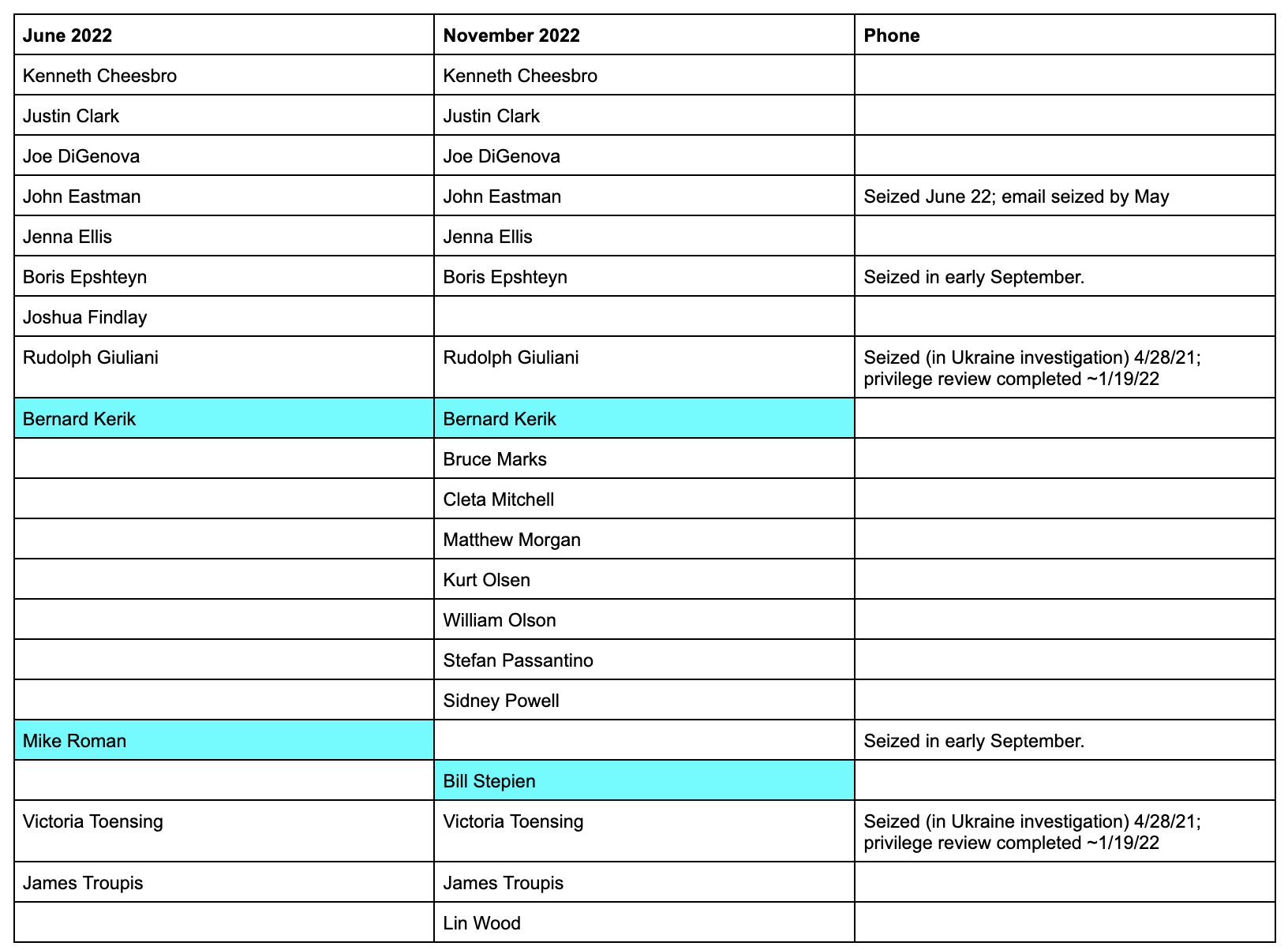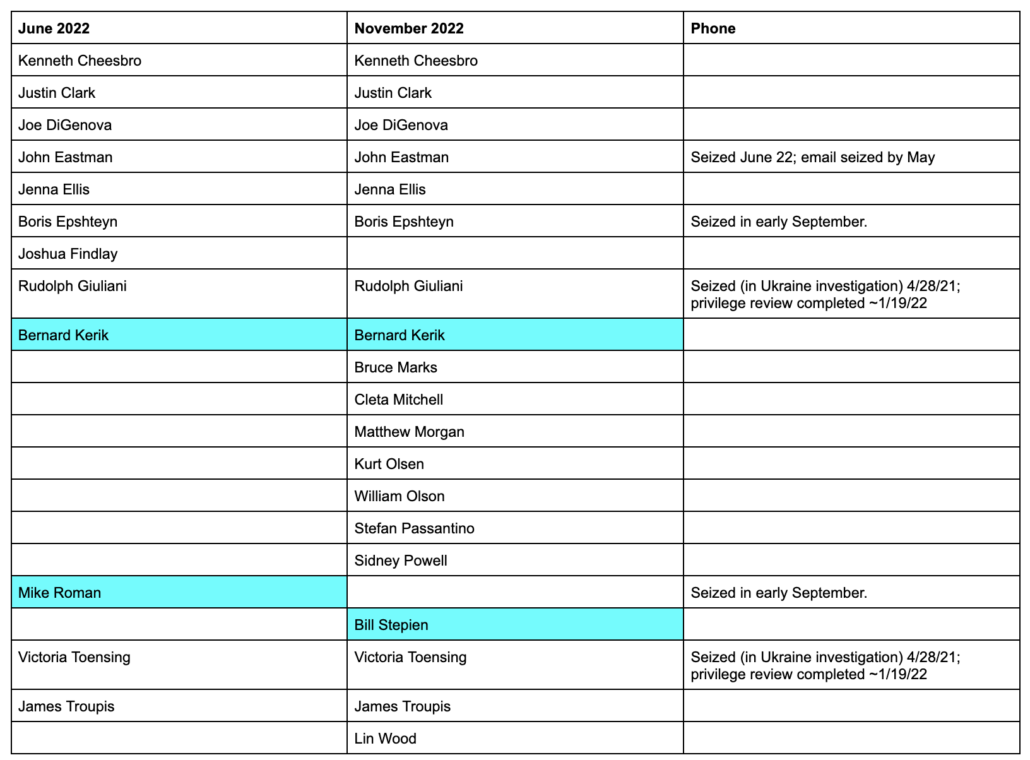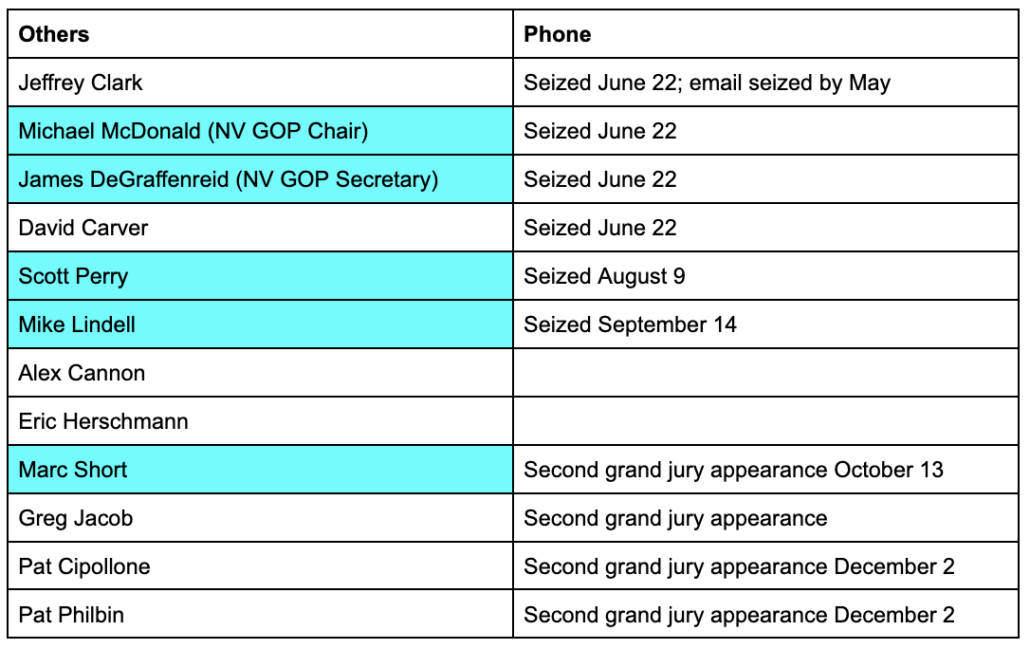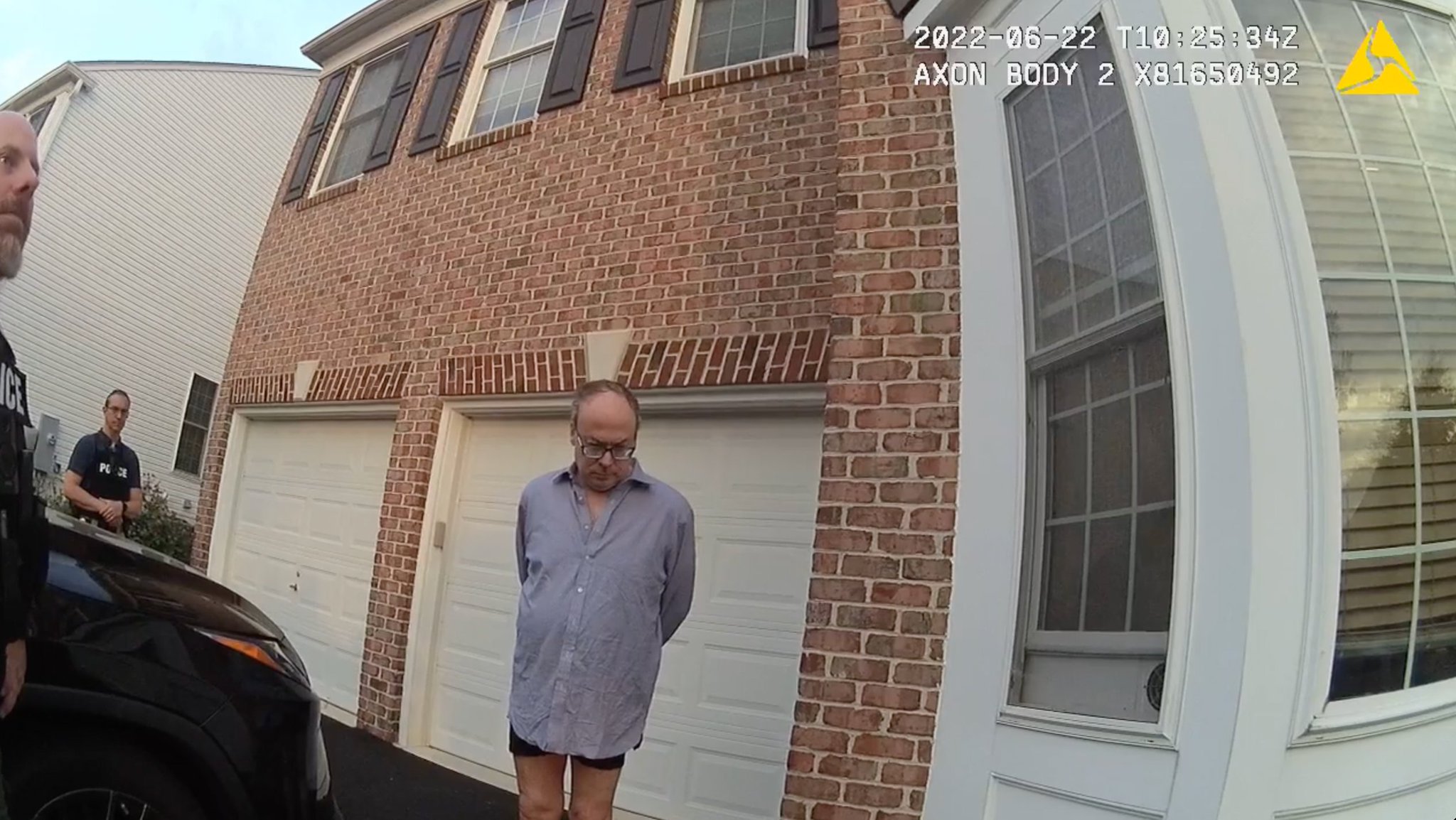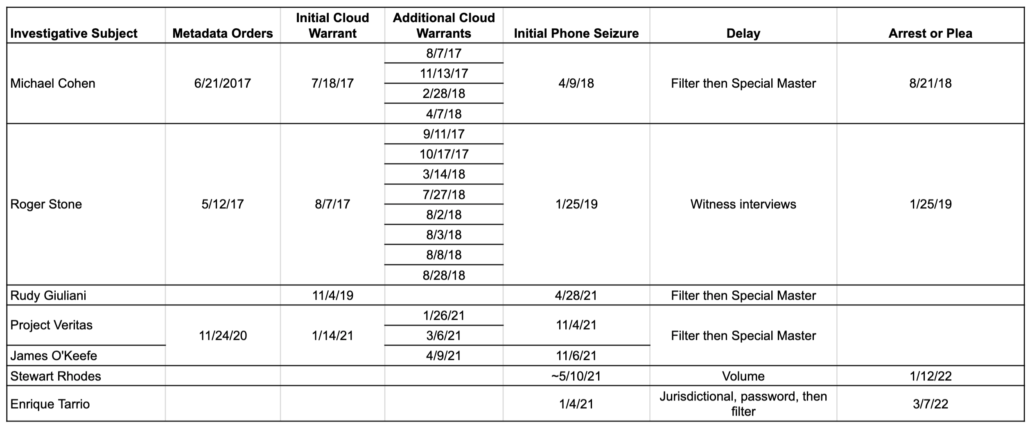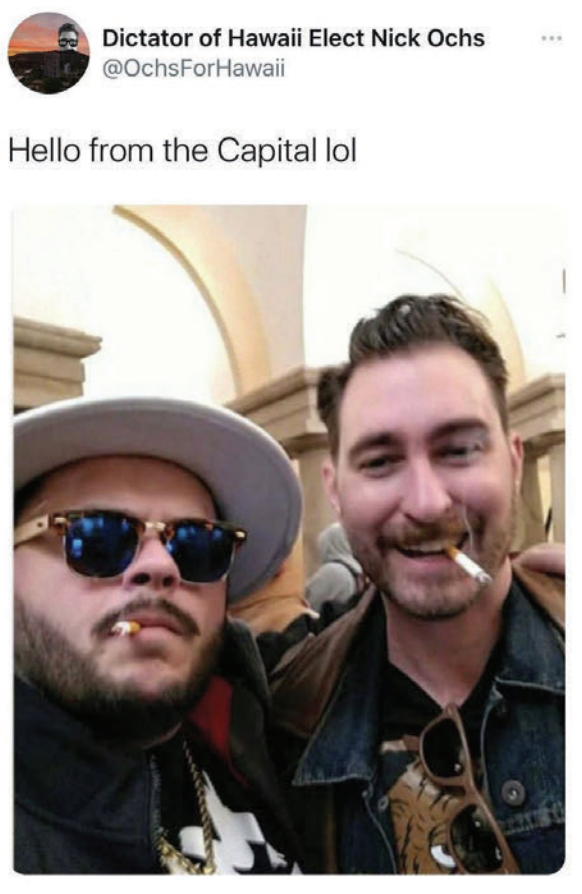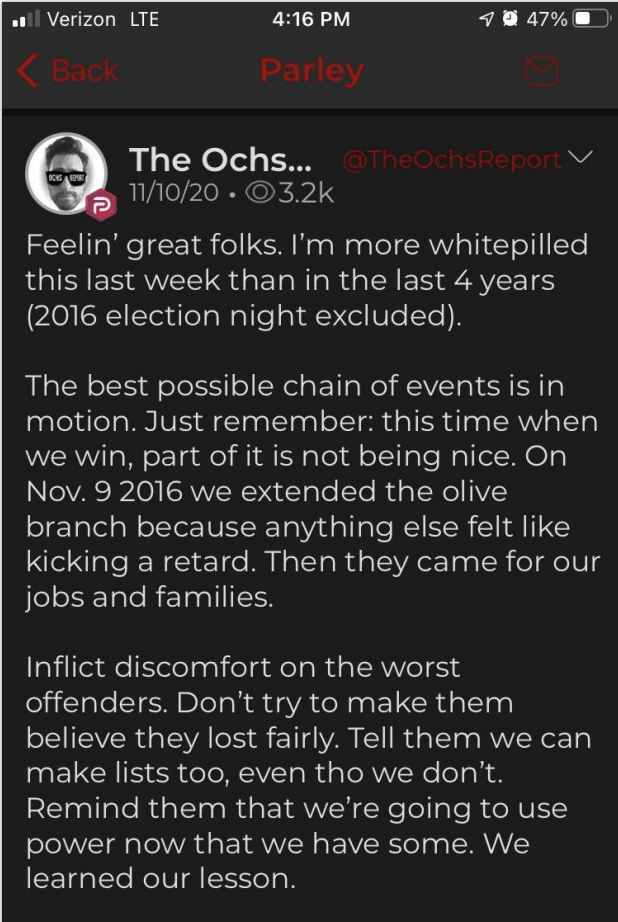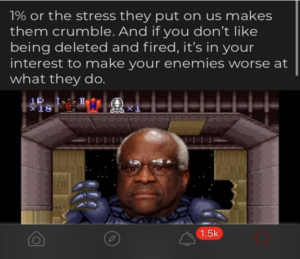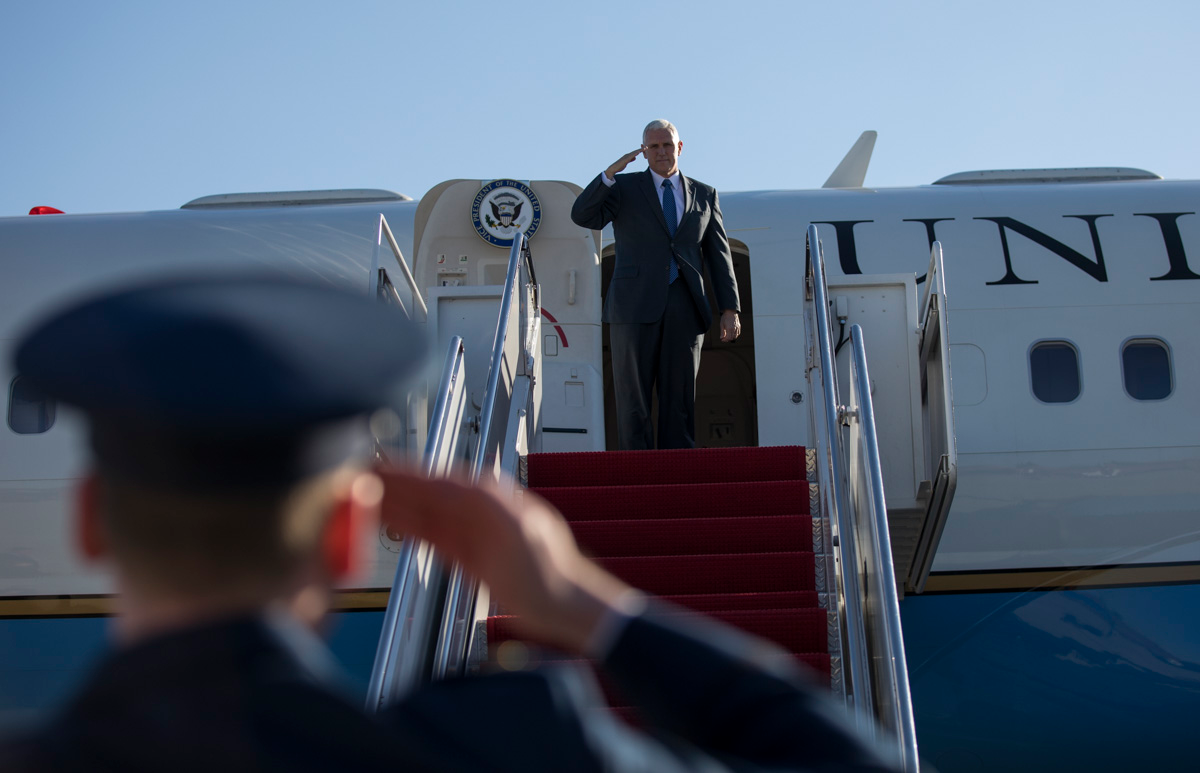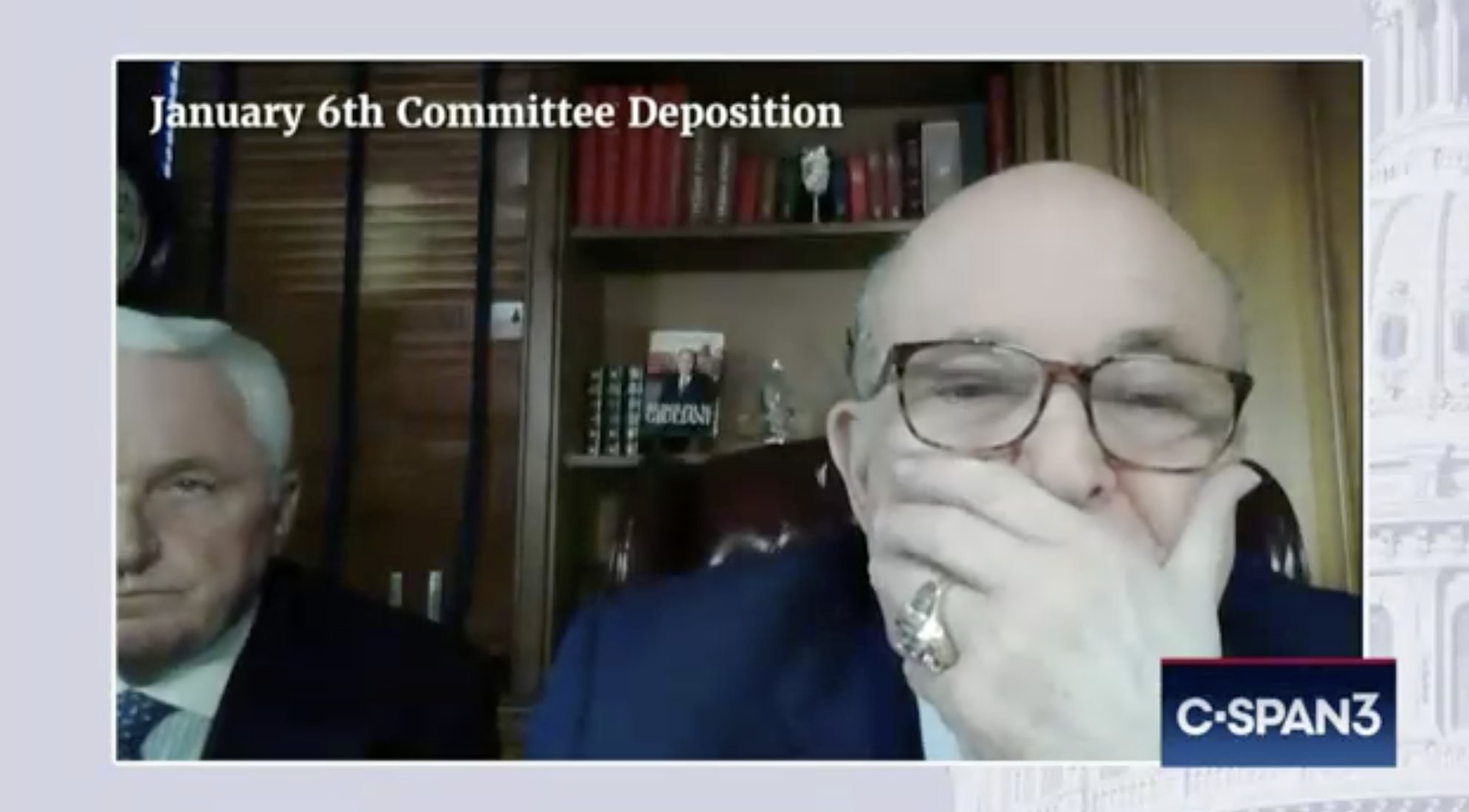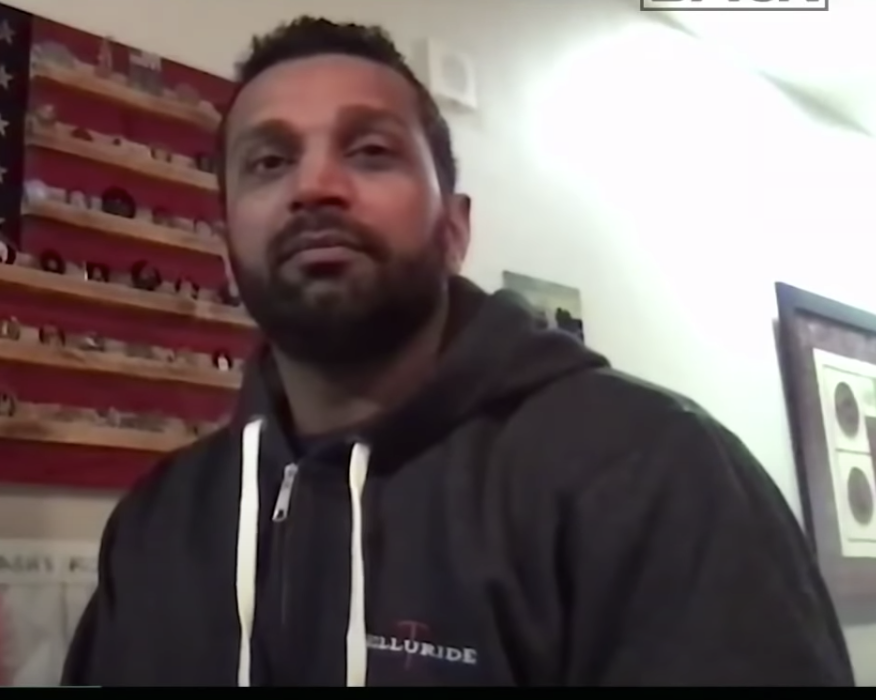I had ambitious plans to do four things today: write this post on what I’m calling the Roger Stone convergence, wash my walls in advance of priming them for paint, writing about how we’d all be better off remembering that Elmo (Elon Musk — like most nicknames I adopt, I wasn’t smart enough to make that one up) just entered a forced marriage, and explaining why this Intercept article is a piece of shit.
Lo and behold, as I was sitting around procrastinating and rationalizing that I shouldn’t climb a ladder while Mr. emptywheel was on his tenth ever visit to the office where he has worked at for 18 months, I saw that Mike Masnick wrote the article about the Intercept piece I was contemplating writing, down to multiple observations that the journalists kept including things that have fuck all with what they claim they’re writing about.
In other words, this entire system has literally fuck all to do with the rest of the article, but the Intercept makes it out to be a system for suppressing information.
[snip]
The article continues to pinball around, basically pulling random examples of questionable government behavior, but never tying it to anything related to the actual subject. I mean, yes, the FBI does bad stuff in spying on people. We know that. But that’s got fuck all to do with CISA, and yet the article spends paragraphs on it.
There are just two things I wanted to add to Masnick’s post (really, go read his), first to add some points about the Intercept’s “Hunter Biden” “laptop” claims, and also to talk about why this matters so much.
Masnick writes at length about how fucking stupid the Intercept’s take on the “Hunter Biden” “laptop” is. I want to add a few key points, interspersed with Masnick’s.
And then, I can’t even believe we need to go here, but it brings up the whole stupid nonsense about Twitter and the Hunter Biden laptop story. As we’ve explained at great length, Twitter blocked links to one article (not others) by the NY Post because they feared that the article included documents that violated its hacked materials policy, a policy that had been in place since 2019 and had been used before (equally questionably, but it gets no attention) on things like leaked documents of police chatter. We had called out that policy at the time, noting how it could potentially limit reporting, and right after there was the outcry about the NY Post story, Twitter changed the policy.
Yet this story remains the bogeyman for nonsense grifters who claim it’s proof that Twitter acted to swing the election. Leaving aside that (1) there’s nothing in that article that would swing the election, since Hunter Biden wasn’t running for president, and (2) the story got a ton of coverage elsewhere, and Twitter’s dumb policy enforcement actually ended up giving it more attention, this story is one about the trickiness in crafting reasonable trust & safety policies, not of any sort of nefariousness.
Yet the Intercept takes up the false narrative and somehow makes it even dumber:
In retrospect, the New York Post reporting on the contents of Hunter Biden’s laptop ahead of the 2020 election provides an elucidating case study of how this works in an increasingly partisan environment.
Much of the public ignored the reporting or assumed it was false, as over 50 former intelligence officials charged that the laptop story was a creation of a “Russian disinformation” campaign.
Interjection: These men likely have spent too much time with Glenn Greenwald, who lies about what the former spooks did as regularly as some people attend church. They didn’t “charge” that the story was a creation of Russian disinformation. They said it had the hallmarks of such a campaign, but emphasized that they didn’t know.
It is for all these reasons that we write to say that the arrival on the US political scene of emails purportedly belonging to Vice President Biden’s son Hunter, much of it related to his time serving on the Board of the Ukrainian gas company Burisma, has all the classic earmarks of a Russian information operation.
We want to emphasize that we do not know if the emails, provided to the New York Post by President Trump’s personal attorney Rudy Giuliani, are genuine or not and that we do not have evidence of Russian involvement — just that our experience makes us deeply suspicious that the Russian government played a significant role in this case.
Then they provided around six reasons why they believed it might be true. All six were and remain true (and there has been reinforcement of several since then). Glenn likes to claim these spooks lied, which is nearly impossible, since they simply expressed a belief. Importantly, their belief was and remains eminently reasonable.
Now back to Masnick:
The mainstream media was primed by allegations of election interference in 2016 — and, to be sure, Trump did attempt to use the laptop to disrupt the Biden campaign. Twitter ended up banning links to the New York Post’s report on the contents of the laptop during the crucial weeks leading up to the election. Facebook also throttled users’ ability to view the story.
In recent months, a clearer picture of the government’s influence has emerged.
In an appearance on Joe Rogan’s podcast in August, Meta CEO Mark Zuckerberg revealed that Facebook had limited sharing of the New York Post’s reporting after a conversation with the FBI. “The background here is that the FBI came to us — some folks on our team — and was like, ‘Hey, just so you know, you should be on high alert that there was a lot of Russian propaganda in the 2016 election,’” Zuckerberg told Rogan. The FBI told them, Zuckerberg said, that “‘We have it on notice that basically there’s about to be some kind of dump.’” When the Post’s story came out in October 2020, Facebook thought it “fit that pattern” the FBI had told them to look out for.
Zuckerberg said he regretted the decision, as did Jack Dorsey, the CEO of Twitter at the time. Despite claims that the laptop’s contents were forged, the Washington Post confirmed that at least some of the emails on the laptop were authentic. The New York Times authenticated emails from the laptop — many of which were cited in the original New York Post reporting from October 2020 — that prosecutors have examined as part of the Justice Department’s probe into whether the president’s son violated the law on a range of issues, including money laundering, tax-related offenses, and foreign lobbying registration.
Interjection: The Intercept’s representation of what the WaPo and NYT wrote is horseshit (again, it leads me to suspect these gents have spent too much time listening to Glenn’s rants).
First, as I wrote about the NYT “authenticat[ion]” at the time, the description of the emails was of particular interest because it cited someone who had familiarity with the investigation.
People familiar with the investigation said prosecutors had examined emails between Mr. Biden, Mr. Archer and others about Burisma and other foreign business activity. Those emails were obtained by The New York Times from a cache of files that appears to have come from a laptop abandoned by Mr. Biden in a Delaware repair shop. The email and others in the cache were authenticated by people familiar with them and with the investigation.
That person could have been an FBI agent leaking about the investigation (as likely has happened more recently, when someone revealed they believe there is sufficient evidence to charge on crimes unrelated to the “laptop,” probably an effort to pressure US Attorney David Weiss to charge Hunter Biden). Or it could be someone like Mac Issac or Robert Costello, both of whom were in the chain of custody of the “laptop,” the testimony from whom might be of interest to the Hunter Biden investigation and/or might be of interest in the investigation into Rudy Giuliani’s negotiations with known Russian agents for Hunter Biden dirt that almost exactly resembles what the laptop is. The story actually doesn’t say the FBI first obtained the emails from the laptop. Indeed, the story reports that the foreign influence aspect of the investigation started in 2018, before the FBI got the laptop, in which case the FBI may have obtained the emails from Apple, which is where at least some of the content on the laptop came from. Almost certainly the FBI would have obtained the iCloud content independently anyway, to ensure the integrity of their chain of evidence. But all the NYT said is that someone — perhaps someone who has been questioned in the investigation — is leaking details to the press. All the NYT has done is get the emails from someone involved in the attack on Hunter Biden and — possibly with their help — authenticate the same headers anyone else has.
That doesn’t say “the laptop” is authentic; it says the investigation into Hunter Biden has been grossly politicized.
Now, before we review what the WaPo said, remember that reporters are citing this article to support a claim that the “laptop” was not disinformation. The goal here is to suggest authenticity. For those purposes, here’s what that WaPo story says:
Among the reasons for the inconclusive findings was sloppy handling of the data, which damaged some records. The experts found the data had been repeatedly accessed and copied by people other than Hunter Biden over nearly three years. The MacBook itself is now in the hands of the FBI, which is investigating whether Hunter Biden properly reported income from business dealings.
Most of the data obtained by The Post lacks cryptographic features that would help experts make a reliable determination of authenticity, especially in a case where the original computer and its hard drive are not available for forensic examination. Other factors, such as emails that were only partially downloaded, also stymied the security experts’ efforts to verify content.
[snip]
In their examinations, Green and Williams found evidence that people other than Hunter Biden had accessed the drive and written files to it, both before and after the initial stories in the New York Post and long after the laptop itself had been turned over to the FBI.
Maxey had alerted The Washington Post to this issue in advance, saying that others had accessed the data to examine its contents and make copies of files. But the lack of what experts call a “clean chain of custody” undermined Green’s and Williams’s ability to determine the authenticity of most of the drive’s contents.
“The drive is a mess,” Green said.
He compared the portable drive he received from The Post to a crime scene in which detectives arrive to find Big Mac wrappers carelessly left behind by police officers who were there before them, contaminating the evidence.
That assessment was echoed by Williams.
“From a forensics standpoint, it’s a disaster,” Williams said.
[snip]
Analysis was made significantly more difficult, both experts said, because the data had been handled repeatedly in a manner that deleted logs and other files that forensic experts use to establish a file’s authenticity.
“No evidence of tampering was discovered, but as noted throughout, several key pieces of evidence useful in discovering tampering were not available,” Williams’ reports concluded.
[snip]
Some other emails on the drive that have been the foundation for previous news reports could not be verified because the messages lacked verifiable cryptographic signatures. One such email was widely described as referring to Joe Biden as “the big guy” and suggesting the elder Biden would receive a cut of a business deal.
I’ve also been told that since the laptop was not airgapped, it’s possible Burisma emails were downloaded after Russia reportedly hacked Burisma, meaning those emails could absolutely be fraudulent.
So the Intercept reporters display their highly attuned nose for disinformation by deeming worthy of reporting a “laptop” that does have emails with valid keys downloaded from iCloud (in partial fashion, which should itself raise questions) but also includes a great deal of shit and obvious alteration. The only thing this “laptop” is useful for reporting on is how unreliable “the laptop” as a package is. It is useful for nothing more than serving as the shiny object it was used for in October 2020. Any reporter citing this report as proof that stuff wasn’t forged — or that the whole “laptop” wasn’t packaged up with the help of the same people who were peddling this information to Rudy in the same time period — discredits themselves. The report specifically said such conclusions were impossible and raised a lot of reasons to be more concerned about “the laptop.” The report shows that this “laptop” was a serial hit job and that for a second straight election, people close to Trump once again tried to win an election by using stolen personal data.
Back to Masnick.
The Zuckerberg/Rogan podcast thing has also been taken out of context by the same people. As he notes, the FBI gave a general warning to be on the lookout for false material, which was a perfectly reasonable thing for them to do. And, in response Facebook did not actually block links to the article. It just limited how widely the algorithm would share it until the article had gone through a fact check process. This is a reasonable way to handle information when there are questions about its authenticity.
But neither Twitter nor Facebook suggest that the government told them to suppress the story, because it didn’t. It told them generally to be on the lookout, and both companies did what they do when faced with similar info.
From there, the Intercept turns to a nonsense frivolous lawsuit filed by Missouri’s Attorney General and takes a laughable claim at face value:
Documents filed in federal court as part of a lawsuit by the attorneys general of Missouri and Louisiana add a layer of new detail to Zuckerberg’s anecdote, revealing that officials leading the push to expand the government’s reach into disinformation also played a quiet role in shaping the decisions of social media giants around the New York Post story.
According to records filed in federal court, two previously unnamed FBI agents — Elvis Chan, an FBI special agent in the San Francisco field office, and Dehmlow, the section chief of the FBI’s Foreign Influence Task Force — were involved in high-level communications that allegedly “led to Facebook’s suppression” of the Post’s reporting.
Interjection: This Intercept story was dated October 31, which last I checked is after October 28. Which means if these reporters were actually reporting from the docket, then they should be accountable for this October 28 filing which says that — according to Meta — the plaintiffs in this nonsense lawsuit made up the bit about Agent Chen.
Meta, however, recently sent Plaintiffs’ counsel a letter—attached as Exhibit A—explaining that Plaintiffs’ understanding of Meta’s statement concerning ASAC Chan is “incorrect.” Meta further stated that that “Mr. Chan at no point in time advised Meta ‘to suppress the Hunter Biden laptop story’ . . . [n]or did any of his colleagues.” Based on this newly received evidence, the Court should amend the Deposition Order, and withdraw its authorization of a deposition of ASAC Chan. ASAC Chan, a management-level FBI official, should not have to divert time away from his official duties to participate in an expedited deposition when the record contains no evidence suggesting that he has engaged in the communications that led the Court to authorize his deposition in the first place.
[snip]
Plaintiffs also relied on several of their own self-serving allegations concerning ASAC Chan—rather than actual evidence—to justify his deposition. See ECF No. 86 at 19-21 (referring to various allegations in Plaintiffs’ Second Amended Complaint). Those allegations generally embellished certain innocuous, public statements ASAC Chan made concerning routine cyber threat discussions he had with various companies, including social media companies. For example, Plaintiffs rely on their allegation that ASAC Chan “admits to regular, routine coordination about censorship with social-media platforms,” see id. at 19 (quoting 2d Am. Compl. ¶ 389), but that allegation relies on an interview in which ASAC Chan simply stated: the FBI regularly “shar[ed] intelligence with technology companies, with social media companies, so that they could protect their own platforms . . . we have all of these methods for collecting intelligence . . . [w]e share them with you and then you do what you want with them to protect your networks,” https://www.banyansecurity.io/resource/get-it-started-get-it-done/ (cited in 2d Am. Compl. ¶¶ 387-89) (emphasis added). Plaintiffs could not identify a single quotation in that interview where ASAC Chan ever stated that the FBI asked or pressured any social media company to remove any content from its platform. Plaintiffs also relied on an allegation that ASAC Chan had stated that social media platforms have been “trying to take down any misinformation or disinformation” and that they have “portals where [users] can report” election-related misinformation.” ECF No. 86 at 20. Again, Plaintiffs could not quote any portion of ASAC Chan’s statement where he stated that he, or anyone else at the FBI, asked or pressured any social media company to remove any content from its platform.
[snip]
Meta emphasized that “Mr. Chan at no point in time advised Meta ‘to suppress the Hunter Biden laptop story’ . . . [n]or did any of his colleagues.”
The letter from Facebook to the plaintiffs also notes there are no communications that support their Facebook claims.
We identified Mr. Chan to you during a phone call on September 15, 2022. On that call, we identified Mr. Chan as Meta’s primary individual point of contact on the FBI’s Foreign Influence Task Force. And we informed you that we had not identified any emails between Mr. Chan and Meta about Hunter Biden’s laptop. You confirmed in writing after that call that “as referenced in today’s call, we continue to request communications between Meta and FBI’s Foreign Influence Task Force, especially as it relates to the Hunder [sic] Biden laptop story. Reg represented today that he did not believe there are written communications involving” Mr. Chan.
Which is the perfect setup for Masnick’s conclusion about the Hunter Biden story.
Now here, you can note that Dehmlow was the person mentioned way above who talked about platforms and responsibility, but as we noted, in context, she was talking about better education of the public. The section quoted in Missouri’s litigation is laughable. It’s telling a narrative for fan service to Trumpist voters. We already know that the FBI told Facebook to be on the lookout for fake information. The legal complaint just makes up the idea that Dehmlow tells them what to censor. That’s bullshit without evidence, and there’s nothing to back it up beyond a highly fanciful and politicized narrative.
But from there, the Intercept says this:
The Hunter Biden laptop story was only the most high-profile example of law enforcement agencies pressuring technology firms.
Except… it wasn’t. Literally nothing anywhere in this story shows law enforcement “pressuring technology firms” about the Hunter Biden laptop story.
This story proves the opposite of what it claims.
It proves that the reporters who wrote it read a report that cautioned strongly about relying on the “Hunter Biden” “laptop” because of all the forensic problems with it — which is one reason among many why responsible reporters shouldn’t have reported on it in October 2020 (and most did not, precisely because there was nothing reliable). And it further shows to substantiate their core claim of coercion, the reporters rely on sources that themselves made up claims of coercion.
And here’s why it matters.
As Masnick lays out, the Intercept reporters “pingpong” from topic to topic, with little evident understanding of the topics they’re talking about. Several of the meeting notes they try to spin as wildly spooky deal with how one runs elections in an era of outright disinformation — shit like Presidential candidates repeatedly making false claims about the reliability of the vote count. This one, for example, focused primarily on the difficulties election workers face as they’re trying to tally election results amid a cloud of rumors and deliberately false claims.
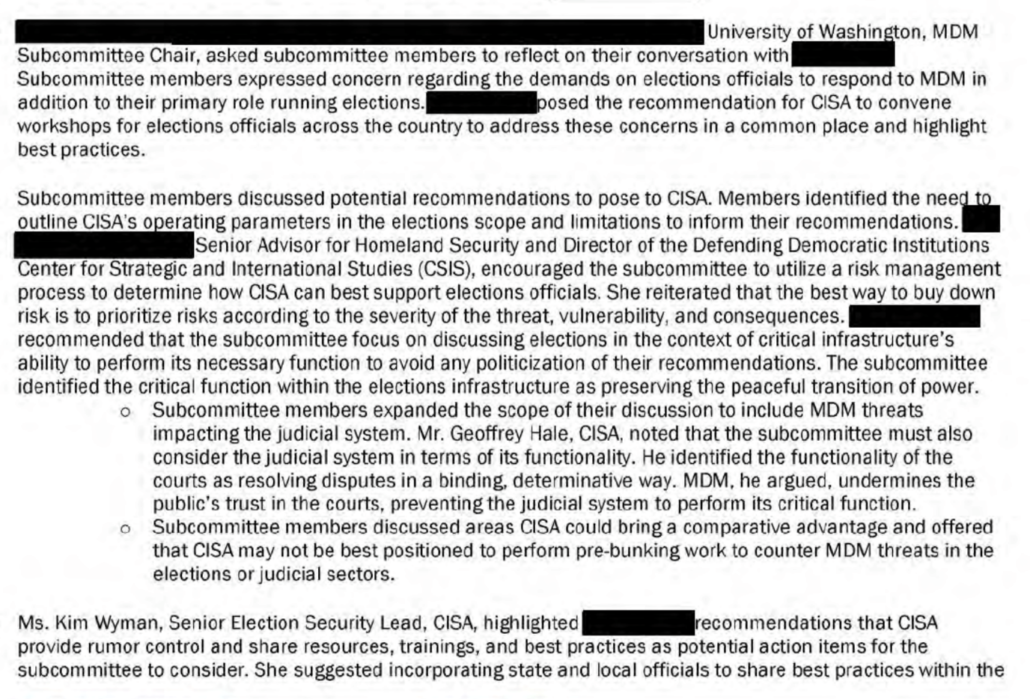
The report makes quite clear that what’s at stake is the “peaceful transition of power.”
As Masnick recalled, Chris Krebs debunked a lot of false claims in 2020 and Trump promptly fired him for correctly stating that the elections were free and fair.
This is the kind of thing that the Intercept reporters — reporters who ignored a filing that debunked their key claim about FBI coercion and who didn’t understand that the WaPo said the opposite of what they claimed — appear to want to get rid of. If they achieved what they claim they want, CISA would no longer be able to tell local election supervisors about the false claims armed men trolling dropboxes are making to justify their actions. If they achieved what they claim to want, CISA would not be able to share information nationally about organized disinformation campaigns targeting mail-in votes.
The logical outcome, if these Intercept reporters succeeded in halting what they portray in the story, is that CISA would not be able to protect your vote.
Nor would it be able to protect election workers like Ruby Freeman from false claims that Rudy Giuliani spread, falsely claiming a ginger mint was a thumb drive used to steal votes.
In an opinion denying Rudy’s motion to dismiss a defamation lawsuit from Freeman and Shaye Moss, Beryl Howell cites the harm that the mother and daughter claim arises from Rudy’s false claims.
The accusations levied against plaintiffs had consequences. Plaintiffs claim they have experienced online, personal, and professional consequences directly resulting from Giuliani’s statements and conduct. See id. ¶¶ 140–57. Strangers camped out near Freeman’s home in Georgia, harassing her and her neighbors. Id. ¶ 141. “Christmas cards were mailed to Ms. Freeman’s address with messages like, ‘Ruby please report to the FBI and tell them you committed voter fraud. If not[,] you will be sorry,’ and ‘You deserve to go to jail, you worthless piece of shit whore.’” Id. ¶ 143. Protesters targeted her home on January 5 and January 6, 2021, though Freeman had fled her home at the recommendation of the Federal Bureau of Investigation. Id. ¶¶ 144–45. Pizza delivery orders were ordered to her home that her family never ordered, which is a common tactic of online harassment called “doxx[ing].” Id. ¶ 142. Local police received more than twenty harassing phone calls while monitoring Freeman’s phone and, eventually, she had to change her email and phone numbers. Id. ¶ 140. Freeman has experienced strangers harassing her in public and has lost friendships, id. ¶¶ 148–49, plus she has had to cease her online business because of prolonged harassment on social media and public events, id. ¶ 147.
She also cites Rudy complaining about how he got banned from social media for making those false claims.
3 Statement 8 was made by Giuliani during an OAN interview on January 18, 2021, as follows:
I mean, they pretty much censored it while it was going on, so they would love to turn the page on it. I mean, I get banned from any of the big tech things when I say that not only was there voter fraud, I have evidence of it, I’ve seen it, I have a motion picture of it. I can show you the voter fraud in living color. It was done in Fulton County, Georgia, it was well over 30,000 ballots were stolen. They were attributed to Biden instead of Trump. Had they been caught and held to account for it, Trump would have won Georgia. Amend. Compl. ¶ 89. A reasonable listener could read this message as referencing the Edited Video and the actions of election workers in Fulton County, which workers include Freeman and Moss.
Finally, she deems sufficiently credible Freeman and Moss’ claims that Rudy made these false claims about the two of them as part of a plan to overturn the democratic election.
7 Giuliani defends the Strategic Plan as a plan to “‘educate the public,’” Def.’s Mem. at 13 (quoting Strategic Plan at 1), rather than to disseminate false information. Regardless of how Giuliani characterizes the goal of the Plan, plaintiffs allege that the Plan’s goal was to overturn the 2020 presidential election, and they allege more than enough evidence in their Amended Complaint to infer that unlawful act was the Plan’s underlying purpose. See, e.g., Amend. Compl. ¶ 9 (noting that the Strategic Plan “relied on the following call to action: ‘YOU CANNOT LET AMERICA ITSELF BE STOLEN BY CRIMINALS – YOU MUST TAKE A STAND AND YOU MUST TAKE IT TODAY’”).
If the Intercept reporters achieved what they claim they want, it would be far harder to combat clear abuse like Rudy’s because it would halt CISA’s efforts to debunk such obvious false claims. It would make it less likely that Rudy would get banned for his false claims about two women who did nothing more than help count the vote. It would be harder to protect your vote, and it would be harder to protect the life and livelihood of election workers.
This article fed the efforts of fascists to delegitimize efforts to protect democracy. Tucker Carlson loved it. For good reason: because he peddles bullshit that poses a risk to your vote and the livelihood of Ruby Freeman.
Not only didn’t it substantiate what it claimed, but it discredited precisely the efforts that will be used next week to protect democracy.
Update: ProPublica reports that, contra Intercept’s claim that disinformation efforts are increasing, DHS under Biden has backed off the kind of support for election workers that was so successful (and important) in 2020.
In May, one Department of Homeland Security office instructed staffers that work on “sensitive” topics including disinformation should be put on “immediate hold,” according to material reviewed by ProPublica. In the months that followed, DHS canceled a series of planned contracts that would have tracked and studied the proliferation of disinformation and its connection with violent attacks. And after issuing six nationwide warnings about domestic terrorism fueled by disinformation in the first 13 months of the Biden administration, DHS has only issued one in the eight months since.
The government’s retreat comes ahead of midterms in which election officials throughout the country are being inundated with false rumors about their work. After talks on a project to help election officials monitor and respond to threats stalled, election officials from Colorado and Florida wrote a private letter in August to DHS Secretary Alejandro Mayorkas pleading for help.
“Threats and harassment of election officials has become an extremely serious concern and terribly frequent experience for election workers,” they warned, adding, “We are ourselves a crucial part of the nation’s critical infrastructure, in need of and deserving of protection.”
“Time is of the essence,” the officials wrote.
Weeks later, DHS scrapped the project.
[snip]
[E]lection administrators remain deeply concerned.
“States need more support. It is clear that threats to election officials and workers are not dissipating and may only escalate around the 2022 and 2024 elections,” Colorado Secretary of State Jena Griswold, a Democrat, said in an email to ProPublica. “Election offices need immediate meaningful support from federal partners.”
Kevin Drum compared the ProPublica’s worthwhile report with the Intercept one here.

